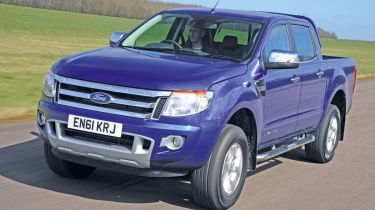Ford Ranger (2011-2023)
US pick-up heritage could make difference for newcomer
Ford knows a thing or two about pick-ups. Its US model, the F-Series, is one of the biggest-selling vehicles of all time, so the new Ranger has an impressive pedigree.
It looks the part, too. All Rangers feature a bold three-bar grille, but Limited trim adds stainless-steel sidesteps and stylish alloy wheels, so the smart new Ford rivals the VW Amarok for road presence.
The Ranger is nearly 10cm longer than its next biggest rival (the Hilux), yet the gigantic proportions don’t leave it trailing the other cars in town. You’re always aware of its huge dimensions in tight spaces, but its 12.7-metre turning circle is the tightest here.
You can’t escape its size when getting in and you really need those glitzy sidesteps to help you climb aboard. Once inside, the tall seating position leaves you with a commanding view of the road. You look down on occupants of large SUVs and are on an equal footing with Transit and bus drivers when you meet them in traffic.
It’s much the same story in the VW and Toyota, but there are differences in the cabins. For example, only the Ranger and Amarok have reach-adjustable steering wheels and the more expensive Ford is the only model here with leather trim and electric seat adjustment.
Used - available now

2016 Tesla
Model S
78,000 milesAutomaticElectric
Cash £18,999
2015 Audi
RS4 Avant
82,080 milesAutomaticPetrol4.2L
Cash £21,995
2014 Audi
RS6 Avant
74,500 milesAutomaticPetrol4.0L
Cash £29,750
2020 Volkswagen
e-Golf
11,142 milesAutomaticElectric
Cash £12,690The Ranger’s cabin design is on a par with the VW’s for simplicity and ease of use, but it doesn’t have the classy touches that mark the Amarok out as something special – many family hatchbacks don’t even have the VW’s smart carpet-lined door pockets.
Limited trim comes loaded with standard kit, such as rear parking sensors, climate and cruise control and heated seats. There’s even a USB socket and Bluetooth connectivity – everything you need to use the Ranger as a mobile office for your business.
But while the cabin quality comes straight out of Ford’s mainstream models, the driving experience is workmanlike. The noisy 2.2-litre diesel engine is the least powerful of this trio and runs out of puff quickly. The Ranger is a match for the VW against the clock, though, and the Amarok’s longer upper gear ratios mean the Ford has more poke on motorways.
A low first gear makes the most of the Ranger’s hauling potential with heavy loads on board, but when pulling away quickly, you soon have to grab second. And although the mechanical shift action of the gearbox is more positive than the notchy feel of the VW’s, it still takes care to drive smoothly. Even then, the Ford’s firm suspension jars over anything other than perfectly smooth roads. It bounces enthusiastically over speed bumps and thumps into potholes.
All three of our pick-ups have heavy-duty cart springs at the rear, but the Ranger has the least forgiving ride. The trade-off comes in two forms: it resists body roll much more effectively than rivals and can carry 1,152kg – a useful 47kg more than the Amarok.
Of course, you don’t buy a pick-up for driving thrills, but the Ford is the best option here if they’re a consideration. Accurate steering makes it easier to drive with confidence on narrow roads, while cornering composure and grip are both impressive.
Rear passenger space is a match for the Toyota and VW, plus the Ranger has the longest load bed of the three. Limited trim gets a neat sliding rail system, which has adjustable tie-down points for loads.
If you expect to visit muddy building sites or slippery campsites, a rotary knob on the centre console makes the transition from two to four-wheel drive simple, and more adventurous owners will appreciate the Ford’s best-on-test 800mm wading depth.
The latest Ranger is no substitute for a proper SUV when it comes to comfort and refinement, but it’s still a competitive new arrival in the pick-up truck class.
Details
Chart position: 2
WHY: The new kid on the block has it all to do. The pick-up market has never been so competitive, but the Ranger has great pedigree.







